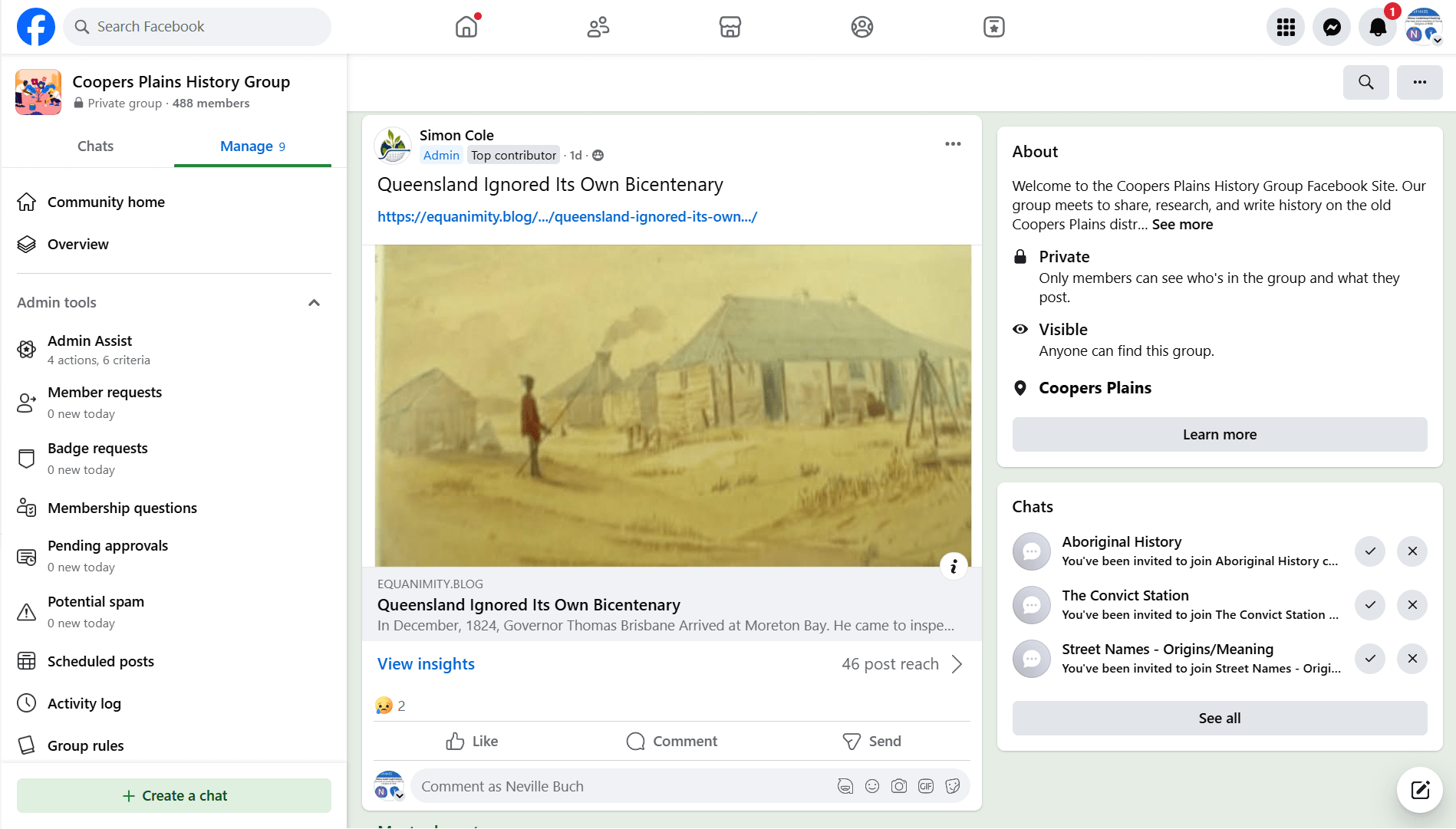Dear friends,
A message not from me, but, as one of the many Queensland public, I support.
“Queensland Government’s inability to deal with histories.”
Queensland Ignored Its Own Bicentenary
Cultural Amnesia In Queensland: A Bicentenary Missed
There is a stupidity with the way politicians think (generality). They think promoting a serious and occasional (think of the full dictionary meaning of “occasion”; it is not simply meaning periodical) consideration of the histories must be a celebration and thus is in danger of provoking an episode in the culture-history wars; and thus “run away” from problems. Where do these politicians get off on such poor thinking? In a senior class of history, a political positioning that history must be celebratory or a political attack is “dumb”.
Historians today well have the capacity to make histories an occasion. Unlike some politicians and marketers, historians can think on more than one issue at the same time.
So, what is the matter really about?
Political Control
Political control is the control given through power of position held by influential political personnel. In terms of social psychology, control is a person’s ability or perception of their ability to affect themselves, others, their conditions, their environment or some other circumstance. Control over oneself or others can extend to the regulation of emotions, thoughts, actions, impulses, memory, attention or experiences. In these cases of being reluctant to sponsor or significantly a historical occasion, we have also perceived control. Perceived control is the degree to which they believe that they have control over themselves and the place, people, things, feelings and activities surrounding them. There are two important dimensions: (1) whether the object of control is in the past or the future and (2) whether the object of control is over an outcome, behaviour, or process.
Politicians often do not want you to know the histories because they want to keep their own political and perceived controls hidden. Keep the public in the dark. If you know the histories, you would know:
The cognitive revolution which was completed around the 1940s significantly changed psychology. Being influenced by the ideas of Pavlov and other physiologists, scientists turned their interest in direction of the observable. Away from subjectivity, the objective investigation of behavior became trustworthy and allocable. This revolution helped developing fields of the study of perceived control. Goal-seeking and human motivation became important in many theories. In 1959, Robert W. White introduced a theory of “effectance motivation”, in which human drive for control is explained through an innate need to be able to handle a situation and the obtainment of control over the environment. (Wikipedia)
Today, the same conclusion was reached by integrating theories and practices of subjectivity and intersubjectivity. The scholars practice peaceful compatibility while there are the politicians in Queensland who practice perceived control through conflicts of the culture-history war. This is seen in the phrasing of political rhetoric of, “It’s not scientific”; “It has no economic benefit”; and “It is irrelevant”; and other phrasing which has no after-thought.
As Mai Hassan, Daniel Mattingly, and Elizabeth R. Nugent (2022) state:
Political leaders use different tactics to ensure widespread compliance with state policies and to minimize resistance. Scholarship tends to treat different tactics individually, suggesting fundamental dissimilarities in underpinning logic and goals. We introduce political control as a concept that unifies these different tactics within a single framework and demonstrate the analytical utility of considering seemingly disparate strategies in conversation rather than in isolation. We synthesize a growing recent literature on political control, including innovative approaches to repression as well as studies of indoctrination, distribution, and infiltration. We argue that tactics of political control can be understood to vary along two primary dimensions: the level of violence and the materiality of state actions. We highlight recent inquiry into the downstream effects of political control. We conclude with a call for more research on political control that considers combinations of different tactics, across regime types, in a world where tolerance of violent repression is diminishing. (155)
As well as the histories of Queensland, this cognition histories and sociology is what Queensland politicians need to learn. It will make them better politicians who understand that “you cannot fool all the people all of the time.”
BIBLIOGRAPHY
Bergstrand, K., & Jasper, J. M. (2018). Villains, Victims, and Heroes in Character Theory and Affect Control Theory. Social Psychology Quarterly, 81(3), 228–247. https://www.jstor.org/stable/48588663
Berliner, D. (2014). The Political Origins of Transparency. The Journal of Politics, 76(2), 479–491. https://doi.org/10.1017/s0022381613001412
Berry, C. R., & Gersen, J. E. (2017). Agency Design and Political Control. The Yale Law Journal, 126(4), 1002–1049. http://www.jstor.org/stable/44863339
Clarkson, J. J., Chambers, J. R., Hirt, E. R., Otto, A. S., Kardes, F. R., & Leone, C. (2015). The self-control consequences of political ideology. Proceedings of the National Academy of Sciences of the United States of America, 112(27), 8250–8253. https://www.jstor.org/stable/26463692
Hassan, Mai; Daniel Mattingly, and Elizabeth R. Nugent (2022). Political Control, Annual Review of Political Science, 25:155–74.
Mayer, A. K. (2011). Does Education Increase Political Participation? The Journal of Politics, 73(3), 633–645. https://doi.org/10.1017/s002238161100034x
Featured Image:

Neville Buch
Latest posts by Neville Buch (see all)
- Queensland Government’s inability to deal with histories - January 10, 2025
- Failures in/on Higher Education Economics; the solutions are a start in policy reversal, against commodification - January 6, 2025
- Buch, Neville (2025). Free Thought. UU Underworld, January 2025, page seven - January 4, 2025
